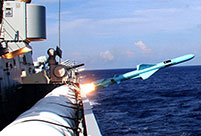

CAIRO, Aug. 7 (Xinhua) -- As Egyptofficially opened on Thursday its "New Suez Canal," experts believe that while the nation's flagship project will help spur the nation's economic comeback, security, corruption and the slack global trade are among the thorny challenges Cairo has to face.
The project, completed using only one year's time instead of three under strict order by Egyptian President Abdel-Fattah al-Sisi, included a newly-dug 35-km waterway alongside the original 190-km Suez Canal, plus a 37-km expansion and deepening of some parts of the old one.
The new waterway is expected to reduce waiting and crossing time. and will allow huge ships with drafts up to 66 feet to pass through, which will encourage more vessels to use the Suez Canal for their trade movement.
Most experts believe that the canal is only a beginning for more such development projects in the Suez Canal corridor that are hoped to attract investments worth billions of dollars and produce thousands of job opportunities.
ADVANTAGES &CHALLENGES
"The New Suez Canal project is considered a leap for Egypt, especially with the development of the surrounding region, because we have economic sectors in Egypt that we have not invested sufficiently," Ibrahim Nawwar, economic expert and former spokesman for the Egyptian industry and foreign trade ministry, told Xinhua.
He added that there are promising investment opportunities in the Suez Canal corridor including logistic and service projects and those related to power generation by solar and wind energies, petrochemicals, mineral industries as well as infrastructure projects including establishment of new tunnels and railway networks to connect Suez and Ismailia with the Sinai Peninsula.
But Nawwar is also cautionary. He said Cairo's agenda to boost the nation's economy through development of and investment in the corridor faces a number of challenges, including sustainability and competitiveness, but the most pressing of the all is security concerns.
"The development projects are planned in areas subjected to waves of violence and terrorism. We cannot convince an investor to spend millions or billions of dollars in a place while he feels unsafe and insecure," the expert warned.
The inauguration of the artificial water channel came when the Sinai State, the Islamic State's affiliate in the country, threatens to kill a Croatian hostage within 48 hours in an online video if Muslim women prisoners were not released. However, the Egyptian authorities promised that the safety of navigation has not under any threat.
As for competitiveness, he said Egypt needs to prop up industries that could deliver competitive and quality products. "If a product is for a higher price and less quality for example, it will decline and and investors will be discouraged to continue."
Meanwhile, corruption stays a major problem, especially when the North African nation still has to operate without a parliament after several delays of the legislative elections.
"The weakest thing in Egypt today is the state administrative system and its corruption, but we hope that after a parliament is elected, the situation will get better through tight supervision and monitoring," Nawwar told Xinhua.
Some experts believe that using the accomplishment of the new waterway for promoting foreign investments around the Suez Canal corridor is one of the challenges facing Sisi's leadership in the coming stage.
"We need a special government committee to run the development of the Suez Canal corridor and to be separate from any other government duties and to have its independent decisions and procedures to outline the establishment of these projects and identify the advantages it could bring to investors," said Sameh Mostafa Zaki, board member of Cairo Chamber of Commerce and deputy chairman of exports department at the chamber.
He told Xinhua that the country has to work on convincing foreign investors to invest in the Suez Canal region, which Cairo intends to turn into one of the most attractive spots for ship navigation and containers.
"The corridor should not be subjected to the laws of local industrial areas, but it should rather be separated and treated as a unique industrial area that is run with a new and different vision based on the experiences of those who preceded us like Jebel Ali in Dubai and also Singapore," Zaki explained.
He explained that the region should not be subjected to the investment law for example, which needs time to be refined, amended and filtered from all blemishes and contradictions. "The corridor should be dealt with as an industrial area with its fresh laws."
POLITICAL DIMENSION
Before the construction of the waterway, the Egyptian president promised that the cost of project was going to be covered by the Egyptians themselves. In one week, Cairo collected over eight billion U.S. dollars from those who bought investment certificates to finance the project, a clear indication that the people of Egypt were confident in Sisi and his administration.
According to the Suez Canal Authority, the waterway is expected to bring the government's annual revenues from five billion U.S. dollars last year to 13.23 billion in 2023, while the number of ships using the canal on the daily basis rising from 49 to 97.
However, considering the slack global trade, many remain suspicious such ambitious goals could be reached.
Hazem Hosni, professor of economy and political sciences at Cairo University, believes that the extension of the Suez Canal is politically motivated.
"I believe the project was for political mobilization in the first place to unite the Egyptians around their leader who managed to accomplish the 35-km waterway in one year as he promised," he said.
Hosni wondered if the new waterway will benefit Egypt or the shipping companies more, since the original canal used to work using only two-thirds of its capacity before the new waterway and since the greater revenues are expected by 2023. "Why was the hurry then?"
"The new waterway has nothing to do with the Suez Canal corridor development project; they are two separate things that do not affect each other," Hosni told Xinhua.
The professor noted that there are still tunnels need to be established around the new waterway and that a feasibility study for the overall project and its spending is not clearly available.
According to the Suez Canal Authority, the waterway is expected to bring the government's annual revenues from five billion U.S. dollars last year to 13.23 billion in 2023, while the number of ships using the canal on the daily basis rising from 49 to 97.
 Female soldiers add color to military parades
Female soldiers add color to military parades Taiwan campus belle with gorgeous look
Taiwan campus belle with gorgeous look  Stunning photos of China’s fighters and airborne troops
Stunning photos of China’s fighters and airborne troops Mums stage breastfeeding flash mob
Mums stage breastfeeding flash mob PLA South China Sea Fleet conducts live fire exercise
PLA South China Sea Fleet conducts live fire exercise Beauty of Tsinghua University transforms into car model
Beauty of Tsinghua University transforms into car model Moscow “spider-man” climbs Chinese skyscraper
Moscow “spider-man” climbs Chinese skyscraper No cleavage allowed at China’s largest gaming expo this year
No cleavage allowed at China’s largest gaming expo this year Photo story: A model’s breast implant surgery
Photo story: A model’s breast implant surgery The trafficked teacher
The trafficked teacher The Uyghurs of China’s ‘Jade City’
The Uyghurs of China’s ‘Jade City’ Japan should recollect cause of Hiroshima
Japan should recollect cause of Hiroshima Photos: Hiroshima and Nagasaki, then and now
Photos: Hiroshima and Nagasaki, then and nowDay|Week